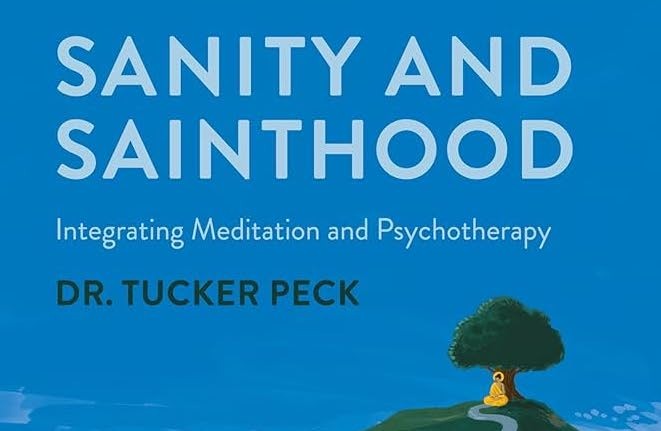Integrating Meditation and Psychotherapy: A Conversation with Dr. Tucker Peck
Psychologist and meditation teacher Dr. Tucker Peck joins Erik Karff to discuss his book Sanity and Sainthood and the integration of therapy with Buddhist meditation practice
MINDFULNESS PSYCHOTHERAPY BOOK RECOMMENDATION


“If your practice is about hating yourself into being better, you'll just become more miserable.” — Dr. Tucker Peck
In this thought-provoking interview, I speak with Dr. Tucker Peck—clinical psychologist, meditation teacher, and author of Sanity and Sainthood: Integrating Meditation and Psychotherapy. Together, we explore what happens when deep meditative practice collides with unresolved psychological material—and how combining psychotherapy with mindfulness can offer a compassionate and sustainable path to healing.
Meditation and Psychotherapy Working Conjointly
Dr. Peck shares what inspired him to write the book: a repeated gap in resources for students navigating intense emotional content following meditation retreats. Contrary to classical Buddhist texts, which suggest meditation dissolves the ego and suffering, Dr. Peck noticed that for many Westerners, it often stirs up old wounds.
“You might feel amazing after one retreat, but after four? You’re likely to meet parts of yourself you’ve buried for years.”
Process vs. Content
A key thesis of the book is simple but powerful:
Work on mental process when you can. Work on content when you have to.
Meditation typically helps people observe and relate to emotions differently. But when overwhelming memories or trauma emerge, psychotherapy offers a framework for unpacking and integrating those experiences.
Self-Compassion as the Foundation
One of the most profound lessons from Tucker's teaching: self-compassion is the most important skill in both therapy and meditation.
“If you're filled with self-hatred, you're meditating to slay yourself and escape the moment—not to embrace it.”
This reframing of practice as an act of kindness—rather than perfection—has a transformative effect.
The Role of Ego in Healing
The conversation dives deep into the concept of ego from both Buddhist and psychological perspectives. Ego is necessary to function—but too much of it can cut us off from emotional and spiritual growth.
“With no ego, you’re helpless. With too much ego, you’re a lizard. Healthy functioning lives somewhere in between.”
Tucker also explores the “CEO of the Mind” metaphor—a reminder that the kind of goal-oriented control that serves us in our careers doesn’t work when applied to our internal world.
“Inside, your mind is more like a dysfunctional democracy than a functional dictatorship.”
Where do I purchase the book?
Click here now to purchase Dr. Tucker Peck's new book. Please note that by purchasing the book directly through the publisher is better for the author. When we purchase through Amazon, they take a sizable percentage.
🗣️ Full Interview Transcript – Erik Karff with Dr. Tucker Peck
Erik Karff:
Hi folks, I’m here with Dr. Tucker Peck, the author of Sanity and Sainthood: Integrating Meditation and Psychotherapy. Tucker is a meditation teacher and licensed clinical psychologist based here in the Bay Area. He graduated from Brown University and the University of Arizona, and he's the founder and current treasurer of the Open Dharma Foundation, which provides scholarships for meditation retreats.
Tucker, thanks for being here and letting me help spread the word about your new book. Writing a book is no small task—I’m thinking about writing one myself and... wow.
Dr. Tucker Peck:
Yeah, it took five years—and it's a pretty thin little book! You could probably fit it in a cargo pants pocket. But yeah, it was a huge effort.
Erik:
So, why this book? Why focus on the intersection of meditation and psychotherapy?
Tucker:
Great question. Students would often ask for a reading list, and I realized something was missing. Most Buddhist texts imply that following the Eightfold Path leads to the disappearance of psychological suffering. And many teachers suggest focusing on psychology is a waste of time—just relate to your experience differently.
But that’s not what I saw. After multiple meditation retreats, people often become more aware of their inner wounds. Dissociation and suppression start to break down. While that’s good in the long run, it can feel worse before it feels better. And nobody was really writing about that.
Erik:
What advice would you give to someone who’s on retreat number four or five and suddenly all this suppressed emotional material is coming up?
Tucker:
I’ve walked thousands of people through this. Most folks start out pretty numb—you need a 9 or 10 on the emotional scale to even feel anything. But as that numbness fades, you start to feel more. And that’s where the real transformation begins.
Most of what makes life worth living—love, connection, meaning—are feelings. So yeah, you’ll feel more pain, but you’ll also feel more joy. There’s only one volume knob.
Erik:
Right—if you turn down the “bad,” you also turn down the “good.” That’s a powerful point.
Tucker:
Exactly. So the advice is: this is normal. It’s not a weird side effect. And if your usual meditation techniques aren’t working, it’s time to look at the content behind the emotion—not just the process.
Erik:
You talk a lot in your book about that distinction—working on process vs. working on content. Can you elaborate?
Tucker:
Sure. In the Dharma I teach, you mostly work with process. If you're angry, you don’t ask “Why am I angry?” Instead, you observe it, break it into physical sensations, and try to relate to it differently.
In psychotherapy, you almost always explore where it comes from. The key is: work with process when it’s enough. If it’s not, dive into the content. That’s why the book is titled the way it is—sometimes sainthood isn’t enough. You need sanity too.
Erik:
I want to talk about self-compassion. You wrote that it’s the most important part of the beginner meditation course you teach. Why?
Tucker:
Because without self-compassion, meditation becomes self-aggression. Sharon Salzberg told this story about asking the Dalai Lama about self-hatred, and he didn’t even understand the concept. But in the West, it's everywhere.
People start meditating to “fix themselves.” But if you’re trying to meditate your way out of self-hatred, you're reinforcing the very problem. Meditation should be about falling in love with the present moment—not escaping it.
Erik:
Yes, and that touches on learning and skill development. If we’re full of self-judgment, we can’t grow.
Tucker:
Exactly. You wouldn’t teach a child piano by yelling at them. But that’s how many people treat themselves. With self-compassion, we can actually improve.
Erik:
You also explore the concept of ego in depth. How do you see it in the context of this work?
Tucker:
Ego is essential—but also limiting. Without one, you’re either a baby or unwell. With too much ego, you’re reactive, defensive, disconnected. So the goal is to build a healthy ego and then transcend it.
In therapy, being told you have a healthy ego is a compliment. In Dharma, it’s an insult. But I think both views are useful. The ego helps you say, “I want the chicken salad,” instead of spiraling through all your conflicting parts. But those parts? They matter too.
Erik:
You once said something in a retreat I loved: the part of the mind that helps us navigate the outside world doesn’t do well when turned inward.
Tucker:
Yeah! In the external world, top-down control works. Declare a goal, make a plan, execute. That’s how people become successful.
But internally, that same approach fails. It's like sitting at a control panel where all the buttons are mislabeled. The one labeled “Make me less crazy” actually makes things worse.
Erik:
So internally, trying to be the CEO of your mind backfires?
Tucker:
Yes. The mind isn’t a dictatorship—it’s a chaotic democracy. You try to issue commands, and all the parts rebel. You say, “Put down the phone,” and your mind says, “Nope.”
Letting go isn’t laziness—it’s wisdom. But it takes years to stop trying to control your inner experience the same way you control your inbox or your job.
Erik:
There’s this metaphor I heard about a conference table—all your parts are seated at it, and someone’s trying to dominate the conversation. That feels related.
Tucker:
Totally. The “chairman” in your mind is often a delusion. It’s a rotating cast of characters, and none of them are actually in control. Through Dharma, you stop believing the chairman has power—and that’s when change becomes possible.
Erik:
This has been such a rich conversation, Tucker. Thank you. Before we wrap—can you share how people can get your book and support the foundation?
Tucker:
Absolutely. If you're in the U.S., you can buy Sanity and Sainthood directly from the distributor—it’s a bit cheaper and more of the money goes to support the work. Erik has the link.
And if you're someone who wants to go on a meditation retreat but can’t afford it, visit opendharmafoundation.org. You can apply for a scholarship—or donate to help someone else go. We’re a nonprofit, so donations are tax-deductible.
Erik:
Thank you again for this conversation. I’ve learned so much, and I know others will too.
Tucker:
Thanks for having me. You asked great questions—ones I haven’t been asked before!






